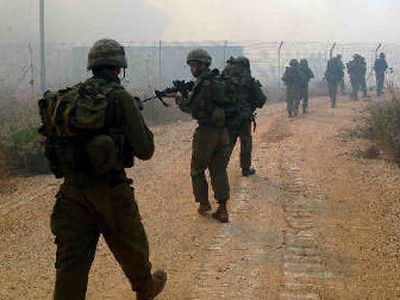No Mideast cease-fire in sight as death toll mounts

BEIRUT, Lebanon – Israeli troops punched into south Lebanon on Wednesday as warplanes flattened houses and buildings including one thought to hold Hezbollah’s top leaders, intensifying an offensive despite mounting international pressure and a Lebanese appeal to spare the country further death and devastation.
The attempt to wipe out the Hezbollah leadership was the most dramatic action on a day that saw Israelis clash with the guerrillas and the Lebanese prime minister say about 300 people in his country had died in the eight-day offensive. Israel broadcast warnings into south Lebanon telling civilians to leave the region, a possible prelude to a larger Israeli ground operation.
Hezbollah, undeterred, fired rockets into the Israeli Arab town of Nazareth, killing two Arab brothers, ages 3 and 9, as they played outdoors.
International pressure mounted on Israel and its key supporter, the United States, to agree to a cease-fire. The rising death toll and scope of the destruction deepened a rift between the U.S. and Europe, and humanitarian agencies were sounding the alarm over a pending catastrophe with a half million people displaced in Lebanon.
Hezbollah denied that any of its “leaders or members” died in the strike in the Bourj al-Barajneh district of south Beirut. The explosives did not blast a leadership bunker, but a mosque under construction, the group said in a statement faxed to the Associated Press.
In a statement, the Israeli military spokesman’s office said: “We attacked a bunker of Hezbollah leaders in the Bourj al-Barajneh neighborhood of Beirut.” The military said the attack took place between 8 p.m. and 9 p.m. and involved 23 tons of explosives.
Last Friday, Israel bombed leader Sheik Hassan Nasrallah’s headquarters but both he and his family survived.
Prime Minister Fuad Saniora, whose weak government has been unable to fulfill a U.N. directive to disarm Hezbollah and put its army along the border with Israel, issued an urgent appeal for a cease-fire. He said his country “has been torn to shreds,” and pointedly criticized the U.S. position that Israel acts in self-defense.
“Is this what the international community calls self-defense?” a stern-looking Saniora asked a meeting of foreign diplomats including U.S. Ambassador Jeffrey Feltman. “Is this the price we pay for aspiring to build our democratic institutions?”
Israel vowed to press the offensive in Lebanon until it destroys the militant Shiite guerrillas’ vast arsenal of missiles and drives Hezbollah fighters far from its northern border.
The Bush administration is standing back to give Israel time to neutralize Hezbollah, but the Europeans fear mounting civilian casualties will play into the hands of militants and weaken Lebanon’s democratically elected government.
President Bush has made the survival of the Saniora government a top priority, but the continuing Israeli operation threatened to return Lebanon to the political chaos and violence that ravaged the country during its long civil war.
Saniora pleaded for the foreign powers to back a cease-fire. “Lift the siege and quickly send humanitarian aid,” he said, demanding compensation from Israel for “immeasurable loss” to infrastructure.
Israel refused to rule out a full-scale invasion.
“There is a possibility – all our options are open. At the moment, it’s a very limited, specific incursion but all options remain open,” said Capt. Jacob Dallal, an Israeli army spokesman.
He said Israel had hit “1,000 targets in the last 8 days – 20 percent (of them were) missile launching sites, control and command centers, missiles and so forth.”
Israel said its airstrikes had destroyed “about 50 percent” of Hezbollah’s arsenal. “It will take us time to destroy what is left,” Brig. Gen. Alon Friedman, a senior army commander, told Israeli Army Radio.
Israel used a radio station near the border to broadcast warnings into south Lebanon telling civilians to leave the region. The radio warnings also stressed that any pickup truck or truck traveling south of the Litani River would be suspected of transporting weapons and rockets and therefore be a potential target of attack.
At least two Israeli soldiers and one militant fighter died Wednesday in the fierce battles in southern Lebanon. Israeli authorities said 18 people were wounded in the Hezbollah rocket attack on Nazareth.
Three large explosions rattled south Beirut shortly after sunset, a time when Israeli strikes have hit in past days.
The Israeli incursion into Lebanon came before dawn Wednesday, when troops clashed with guerrillas near the coastal border town of Naqoura. The troops later pulled back across the border, though witnesses reported two tanks remained about 500 yards inside Lebanon.
With Hezbollah still operating on the border despite a week’s poundings, Israeli strikes were chasing rocket firers with a vengeance, but often hitting others. U.N. peacekeepers’ main headquarters in the south was hit by an Israeli artillery shell after a rocket was fired from nearby. There were no casualties.
Israeli bombers, which had been focusing on Hezbollah strongholds in southern Beirut, also hit a Christian suburb on the eastern side of the capital for the first time.
The target was a truck-mounted machine used to drill for water but could have been mistaken for a missile launcher. No one was hurt.
In the village of Srifa, near Tyre in southern Lebanon, airstrikes flattened 15 houses after rockets were fired from the area. The village’s headman, Hussein Kamaledine, said 25 to 30 people lived in the houses, but it was not known whether they were at home at the time. Many people have fled southern Lebanon.
“This is a real massacre,” Kamaledine told Hezbollah’s Al-Manar TV as fire engines extinguished the blaze and rescue workers searched for survivors.
High casualties also were feared in the nearby town of Salaa and the Hezbollah stronghold of Baalbek in eastern Lebanon, where more houses were devastated.